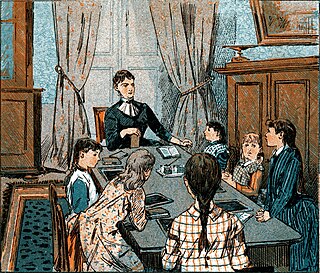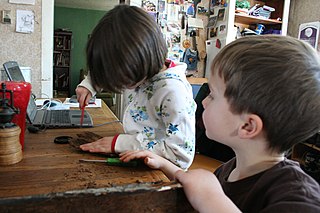
Homeschooling or home schooling, also known as home education or elective home education (EHE), is the education of school-aged children at home or a variety of places other than a school. Usually conducted by a parent, tutor, or online teacher, many homeschool families use less formal, more personalized and individualized methods of learning that are not always found in schools. The actual practice of homeschooling varies considerably. The spectrum ranges from highly structured forms based on traditional school lessons to more open, free forms such as unschooling, which is a lesson- and curriculum-free implementation of homeschooling. Some families who initially attended a school go through a deschool phase to break away from school habits and prepare for homeschooling. While "homeschooling" is the term commonly used in North America, "home education" is primarily used in Europe and many Commonwealth countries. Homeschooling should not be confused with distance education, which generally refers to the arrangement where the student is educated by and conforms to the requirements of an online school, rather than being educated independently and unrestrictedly by their parents or by themselves.

Unschooling is an informal learning method that prioritizes learner-chosen activities as a primary means for learning. Unschoolers learn through their natural life experiences including play, household responsibilities, personal interests and curiosity, internships and work experience, travel, books, elective classes, family, mentors, and social interaction. Often considered a lesson- and curriculum-free implementation of homeschooling, unschooling encourages exploration of activities initiated by the children themselves, under the belief that the more personal learning is, the more meaningful, well-understood, and therefore useful it is to the child. While unschooled students may occasionally take courses, unschooling questions the usefulness of standard curricula, fixed times at which learning should take place, conventional grading methods and standardized tests, forced contact with children in their own age group, the compulsion to do homework regardless of whether it helps the learner in their individual situation, the effectiveness of listening to and obeying the orders of one authority figure for several hours each day, and other features of traditional schooling.
Home education in the United Kingdom of Great Britain and Northern Ireland is often termed "elective home education" ("EHE") to signify the independent nature of practice from state provisions such as education for children with ill-health provided by the local authority in the family home. EHE is a collective term used in the UK to describe education provided other than through the schooling system. Parents have a duty to ensure their children are educated but the education legislation in England and Wales does not differentiate between school attendance or education otherwise than at school. Scots education legislation on the other hand differentiates between public (state) school provision and education "by other means", which includes both private schooling and home education. The numbers of families retaining direct responsibility for the education of their children has steadily increased since the late 1970s. This increase has coincided with the formation of support groups such as Education Otherwise. Home education may involve an informal style of education described as unschooling, informal learning, natural or autonomous learning. Others prefer to retain a structured school at home approach sometimes referred to as homeschooling although the terms are often interchanged.

John Caldwell Holt was an American author and educator, a proponent of homeschooling, and a pioneer in youth rights theory.
Alternative education encompasses many pedagogical approaches differing from mainstream pedagogy. Such alternative learning environments may be found within state, charter, and independent schools as well as home-based learning environments. Many educational alternatives emphasize small class sizes, close relationships between students and teachers and a sense of community.

John Taylor Gatto was an American author and school teacher. After teaching for nearly 30 years he authored several books on modern education, criticizing its ideology, history, and consequences. He is best known for his books Dumbing Us Down: the Hidden Curriculum of Compulsory Schooling, and The Underground History of American Education: A Schoolteacher’s Intimate Investigation Into the Problem of Modern Schooling.
Deschooling is a term invented by Austrian philosopher Ivan Illich. Today, the word is mainly used by homeschoolers, especially unschoolers, to refer to the transition process that children and parents go through when they leave the school system in order to start homeschooling. The process is a crucial basis for homeschooling to work. It involves children gradually transitioning away from their schoolday routine and institutional mentality, redeveloping the ability to learn via self-determination, and discovering what they want to learn in their first homeschool days.

The Home School Legal Defense Association (HSLDA) is a United States-based organization that seeks to aid homeschooling families through legal representation. HSLDA describes itself as a "Christian organization."
Anti-schooling activism, or radical education reform, describes positions that are critical of school as a learning institution and/or compulsory schooling laws; or multiple attempts and approaches to fundamentally change the school system. People of this movement usually advocate alternatives to the traditional school system, education independent from school, the absence of the concept of schooling as a whole, or the right that people can choose how, where and with whom they are educated.

Homeschooling constitutes the education of about 3.4% of U.S. students as of 2012. The number of homeschoolers in the United States has increased significantly over the past few decades since the end of the 20th century. In the United States, the Supreme Court has ruled that parents have a fundamental right to direct the education of their children. The right to homeschool is not frequently questioned in court, but the amount of state regulation and help that can or should be expected continues to be subject to legal debate.
The National Coalition of Alternative Community Schools, or NCACS, is an international organization based in the U.S. city of Ann Arbor, Michigan, dedicated to promoting alternative education. The organization was founded in 1978. It is known for its annual conferences, which bring together the community of community schools and homeschoolers and are held in a different location around the country each year. It also holds regional conferences. The NCACS also produces a directory of alternative community schools which it sells, as well as a quarterly newsletter.
Patrick Farenga is an American writer and educational activist. He is known as a leading advocate of the modern homeschooling movement which started in the 1970s.
Children's geographies is an area of study within human geography and childhood studies which involves researching the places and spaces of children's lives.
Peter Kowalke is an American unschooling advocate best known for his work on grown homeschoolers and the lasting influence of homeschooling. He was one of the first authors to explore the lasting influence that homeschooling has on a person in terms of identity, and produced a large body of work on the topic from 1994 until 2013, after which he stepped back from the homeschooling community to focus on contextualizing the Indian Advaita Vedanta philosophy for American culture.
Education Otherwise (EO) is a registered charity based in England, which aims to provide support and information for families whose children are being educated outside school. Education Otherwise is the foremost Charity across England and Wales that promotes and supports the right of a parent or guardian to home educate their child should they wish to do so. EO is in fact the largest home education charity in the United Kingdom. The organisation derived its name from section 36 of the Education Act 1944, which stated that parents are responsible for the education of their children, "either by regular attendance at school or otherwise." This clause has been retained in subsequent Education Acts, and remains a clear acceptance of the parity and validity afforded an education otherwise than by schooling.

Homeschooling is illegal in many countries. Countries with the most prevalent homeschooling movements include Australia, Canada, New Zealand, the United Kingdom, and the United States. Some countries have highly regulated homeschooling programs as an extension of the compulsory school system; few others, such as Germany, have outlawed it entirely. In some other countries, while not restricted by law, homeschooling is not socially acceptable, or is considered undesirable, and is virtually non-existent.
Anarchism has had a special interest on the issue of education from the works of William Godwin and Max Stirner onwards.
Homeschooling in New Zealand is legal. The Ministry of Education reports annually on the population, age, ethnicity, and turnover of students being educated at home.

Homeschooling in South Africa had been illegal, until it was recognized in 1996 under the South African School Legislation, since then it has grown significantly.
Susannah Sheffer is an author, editor, and activist, focusing on issues of education, prisons, and the death penalty. She is a leader in the unschooling, deschooling, and homeschooling movement. She served on the board of Holt Associates, edited the newsletter Growing Without Schooling (GWS) for many years, and edited the book A Life Worth Living: Selected Letters of John Holt. She is currently a staff member of North Star, an alternative to middle school and high school in Massachusetts.







